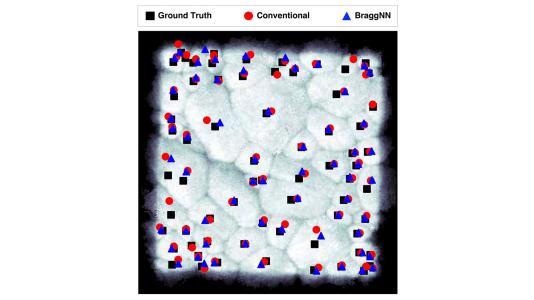From biology to materials science, artificial intelligence (AI) has revolutionized every scientific subject. When it comes to certain types of X-Ray studies, new AI approaches have enabled researchers to get an accurate analysis of their materials in less time.
 Argonne researchers have used artificial intelligence to quickly identify and reconstruct peaks in diffraction data. Image Credit: Antonino Miceli/Argonne National Laboratory.
Argonne researchers have used artificial intelligence to quickly identify and reconstruct peaks in diffraction data. Image Credit: Antonino Miceli/Argonne National Laboratory.
A team of researchers at the U.S. Department of Energy’s (DOE) Argonne National Laboratory is using artificial intelligence to tackle the difficult challenge of evaluating data from high-energy X-Ray studies.
With a new neural network-based technology dubbed BraggNN, the Argonne team can now identify Bragg peaks, which are data points that show the positions and orientations of small individual crystals, in a fraction of the time they used to.
Neural networks (the NN in BraggNN) are algorithms that search for patterns in data and learn to anticipate outcomes over time, allowing for faster data analysis.
BraggNN gives us far greater efficiency and speed than conventional techniques.
Antonino Miceli, Author and Group Leader, Advanced Photon Source, Argonne National Laboratory
High-energy diffraction microscopy (HEDM) has recently emerged as one of the most popular techniques for accurately characterizing complicated materials with high resolution.
Although HEDM has been a significant advance over traditional methods, it is costly and time-consuming. It entails gathering massive datasets, analyzing millions of Bragg diffraction peaks, and reconstructing the sample using those peaks.
The APS modification is projected to significantly improve the pace of HEDM data gathering to under a minute. However, even with the fastest supercomputers, completing a study of several Bragg peaks can take hours or weeks.
Such delays not only impede research but also prevent the use of HEDM data to guide studies, like how scientists researching the growth of cracks in materials could use the collected data to follow the location of those cracks in real-time.
To address these issues, researchers at the APS used artificial intelligence to speed up and simplify Bragg peak analysis. The traditional method includes fitting peak data to a 2D or 3D model, but the study team’s new model can estimate peak positions straight from the data.
Conventional methods work like trying on a suit at a tailor. First you have to try on an estimated shape, and then do form-fitting after it. With our technique, using a neural network, it’s like generating the perfect suit instantly from just a photograph of a person.
Hemant Sharma, Author and Computational Scientist, Argonne National Laboratory
The researchers were able to drastically speed up analysis and improve accuracy after training the algorithm on data with diffraction peaks.
The true accomplishment is that we made peak determinations much faster and also delivered sub-pixel accuracy—the gold standard for making useful conclusions.
Zhengchun Liu, First Author and Computer Scientist, Argonne National Laboratory
BraggNN’s advanced computational methods are particularly well suited to use on a graphics processing unit (GPU) processor, allowing it to perform even faster.
To quickly train the model, the researchers employed the ThetaGPU system at the Argonne Leadership Computing Facility (ALCF), a DOE Office of Science user facility, as well as the Cerebras AI platform at the ALCF AI Testbed.
The Journal of the International Union of Crystallography published a paper based on the research. Jun-Sang Park, Peter Kenesei, Jonathan Almer, Rajkumar Kettimuthu, and Ian Foster from Argonne are among the study’s other authors.
Journal Reference:
Liu. Z., et al., (2022) BraggNN: fast X-ray Bragg peak analysis using deep learning. IUCrJ doi:10.1107/S2052252521011258.